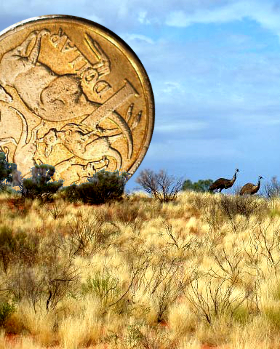NT tops debt record
 The Northern Territory's budget for 2024-25 reveals net debt exceeding $11 billion - a record for the jurisdiction.
The Northern Territory's budget for 2024-25 reveals net debt exceeding $11 billion - a record for the jurisdiction.
The debt figure translates to approximately $42,649 per Northern Territory resident per year, and is projected to increase by over a billion dollars in the next three years.
The debt spike is largely attributed to significant government spending on infrastructure, police, and education.
Chief Minister and Treasurer Eva Lawler described the budget as “not a glamorous budget” in her speech this week.
“You cannot just breathe hot air on the issues and give them a bit of shine with your t-shirt,” Lawler said.
The budget highlights substantial allocations towards essential services, including remote housing, health, education, and policing.
Despite attempts by the Labor government to implement caps and pay freezes, public service costs remain high, with 41 per cent of the government's operating expenses dedicated to the public service, which employs approximately 22,000 individuals.
A significant issue compounding the budget woes is the decline in mining royalties.
Cyclone Megan's impact on mines at Groote Eylandt and McArthur River resulted in a $191 million drop in royalties due to prolonged closures.
This natural disaster might foreshadow future challenges as revenue-generating mines in Groote and Gove are slated to close by 2030.
Lawler emphasised that the budget is a “commonsense” approach aimed at reducing crime and enhancing community safety, despite suggestions that it serves as an election budget.
The government has allocated $570 million for police over the next few years, part of which will fund the recruitment of 200 new officers.
This year's police budget will see an increase to $561 million from $472 million, a response to persistently high crime rates.
Education will also receive a boost, with an additional $100 million from a $1 billion federal top-up, bringing the sector's budget to approximately $1.34 billion.
The NT's health department, however, has exceeded its budget by over $200 million, bringing its annual expenditure to nearly $2.2 billion.
Lawler expressed concern over this blowout, stressing the need for the department to regain budgetary control.
She also called for increased Commonwealth funding due to the NT's high number of chronically ill patients and ageing infrastructure.
Lawler’s comments were met with criticism from unions, with the NT branches of the Australian Medical Association, the Australian Nursing and Midwifery Federation, and the Australian Salaried Medical Officers Federation defending the health department.
They argued that systemic issues and underfunding are the real culprits behind the overspending.
In addition to the primary sectors, the budget includes $69 million for land releases in Darwin and Alice Springs, $1.65 million for a new motocross race track in Darwin, and $410,000 for new ambulances in remote Central Australia.








 Print
Print